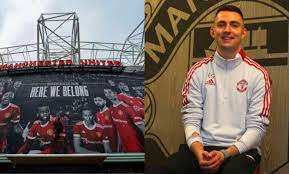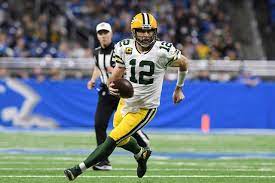FIFA 2010 (World Cup Story) Controversies, Official Song and Prize Money
FIFA 2010 World Cup, The Host Country
The 2010 FIFA World Cup was a major tournament for men’s national association football teams. It was the 19th FIFA World Cup edition. The international football body FIFA, chose South Africa over Egypt and Morocco in 2004 to become the first African country to host the finals. The tournament was held in South Africa from June 11 to July 11, 2010. The bidding process for hosting the tournament finals was open only to African nations.
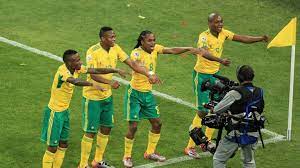
Thirty-two teams were selected for participation through a worldwide qualification tournament that began in August 2007. The matches were held in ten stadiums in nine host cities around the nation, with the opening and closing ceremonies held in the Soccer City Stadium in Johannesburg, South Africa’s largest city.
The organisers released a preliminary list of 13 World Cup locations in 2005: Bloemfontein, Cape Town, Durban, Johannesburg (two venues), Kimberley, Klerksdorp, Nelspruit, Orkney, Polokwane, Port Elizabeth, Pretoria, and Rustenburg. This was reduced down to the 10 locations officially confirmed by FIFA on March 17, 2006. Host nation South Africa and both 2006 World Cup finalists Italy and France were all eliminated in the group stage.
FIFA 2010 World Cup, Hosting Controversies
On May 28, 2015, media outlets reporting the FIFA corruption investigation claimed that high-ranking officials from the South African bid committee had acquired the right to host the World Cup by paying bribes of US$10 million to then-FIFA Vice President Jack Warner and other FIFA Executive Committee members. After cooperating with the FBI and Swiss authorities, FIFA official Chuck Blazer admitted on June 4, 2015, that he and the other members of FIFA’s executive committee were bribed in order to push South Africa’s 1998 and 2010 World Cup bids.

“I and others on the FIFA executive committee accepted to receive bribes in connection with the selection of South Africa as the host nation for the 2010 World Cup,” Blazer explained. The Daily Telegraph claimed on June 6, 2015, that Morocco had won the poll, but South Africa was given the tournament instead.
FIFA 2010 World Cup, The Official Song
The official World Cup song, “Waka Waka (This Time for Africa),” was performed by Colombian singer Shakira and South African band Freshlyground. The song was sung in both English and Spanish. The song is based on “Zangalewa,” a traditional African soldiers’ song. On June 10, Shakira and Freshlyground played the song during a pre-tournament event in Soweto.

It was also performed at the opening and closing ceremonies on June 11 and July 11, respectively. R. Kelly’s “Sign of a Victory” with the Soweto Spiritual Singers was the official song of the 2010 World Cup, and it was also sung at the opening ceremony.
FIFA 2010 World Cup, The Official Ball
The match ball for the 2010 World Cup, manufactured by Adidas, was named the Jabulani, which means “bringing joy to everyone” in Zulu. It was the German sports equipment manufacturer’s 11th World Cup match ball; it featured 11 colors, representing each player of a team on the pitch and the 11 official languages of South Africa.
The Jo’bulani, a special match ball with gold panels, was used in the final in Johannesburg. The ball was created with a new design that included eight thermally bonded, three-dimensional panels. These were made by spherically molding ethylene-vinyl acetate (EVA) and thermoplastic polyurethanes (TPU). The ball surface was textured with grooves, a GripnGroove technology developed by Adidas to improve the ball’s aerodynamics. The design was designed in partnership with researchers from Loughborough University in the United Kingdom and received significant academic input.
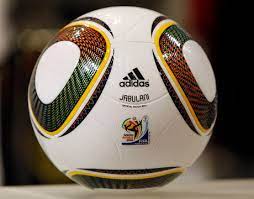
The balls were made in China with latex bladders from India, thermoplastic polyurethane-elastomer from Taiwan, ethylene vinyl acetate, isotropic polyester/cotton fabric, and Chinese glue and ink. Some football players criticized the new ball, claiming that its movements were difficult to predict. Julio César, Brazilian goalkeeper, compared it to a “supermarket” ball that favored strikers and worked against goalkeepers. “We won’t see any long passes in this World Cup because the ball doesn’t fly straight,” Argentinian coach Diego Maradona said. A number of Adidas-sponsored players, on the other hand, reacted positively to the ball.
Also Read: Which is the richest club in the world?
FIFA 2010 World Cup, The Vuvuzelas
The 2010 World Cup finals raised international awareness of the vuvuzela, a long horn blown by fans during matches. Many World Cup competitors, including France’s Patrice Evra, complained about the noise made by the vuvuzela horns, blaming the horns for the team’s poor performance. Other critics include Lionel Messi, who claimed that the sound of the vuvuzelas hampered communication among players on the field, and broadcasting companies, which claimed that the sound drowned out commentators’ voices.
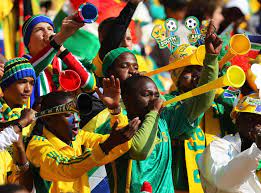
Others watching on television complained that the ambient audio feed from the stadium contained only the sounds of the vuvuzelas, with the usual sounds of people in the stands drowned out. ESPN and other networks, according to a spokesperson, were taking steps to reduce ambient noise on their broadcasts. The BBC also looked into the possibility of providing broadcasts without vuvuzela noise.
FIFA 2010 World Cup, The Prize Money
FIFA stated the total prize money on offer for the tournament at US$420 million (including payments of US$40 million to domestic clubs), a 60% increase over the 2006 tournament.
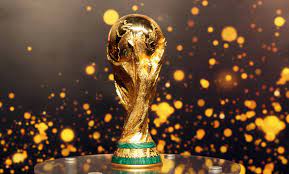
Each of the 32 teams got $1 million in preparation funds before to the competition. The prize money was allocated after the competition as follows;
- US$8 million – To each team eliminated at the group stage (16 teams) ($9.49 million in 2022 US dollars)
- US$9 million – To each team eliminated in the round of 16 (8 teams) ($10.68 million in 2022 US dollars)
- US$14 million – To each team eliminated in the quarter-finals (4 teams) ($16.61 million in 2022 US dollars)
- US$18 million – Fourth placed team ($21.36 million in 2022 US dollars)
- US$20 million – Third placed team ($23.74 million in 2022 US dollars)
- US$24 million – Runner up ($28.48 million in 2022 US dollars)
- US$30 million – Winner ($35.6 million in 2022 US dollars)
FIFA offered compensation to the domestic clubs of players playing their national teams at the World Cup, a first for the competition. This resulted in a total payment of US$40 million to domestic teams.
This was the result of an agreement reached in 2008 between FIFA and European clubs to disband the G-14 group and drop their claims for compensation dating back to 2005 over the financial cost of injuries sustained by their players while on international duty. Such claims were made by Belgian club Charleroi S.C. for an injury to Morocco’s Abdelmajid Oulmers in a friendly game in 2004, and by English club Newcastle United for an injury to England’s Michael Owen in the 2006 World Cup.
FIFA 2010 World Cup, Uruguay Vs Ghana
Only Ghana advanced to the round of 16 out of the six African teams. Despite overcoming France and drawing Mexico, South Africa became the first host nation in World Cup history to be eliminated in the first round, with Ghana and Ivory Coast the only other African sides to win a match. Uruguay and Ghana played on July 2, 2010 at Soccer City in Johannesburg for a spot in the semi-final against the Netherlands.
It was the first time the two teams had met in a senior competitive football match. Uruguay dominated the early stages of the game, but captain Diego Lugano was injured in the first half. Sulley Muntari was given time on the ball by Uruguay just before halftime, and he took advantage by scoring with a shot from 40 yards.
After halftime, Diego Forlán equalized for Uruguay with a free kick from the left side of the field that went over Ghana goalkeeper Richard Kingson’s head. Despite the fact that both teams had chances to win, the match proceeded to extra time as the scores remained level.
Ghana sent a free kick into the box late in extra time, but Luis Suárez blocked Stephen Appiah’s shot on the goal line. On the rebound, Dominic Adiyiah’s header was heading into the goal, but Suárez blatantly blocked the shot with his hands to prevent what would have been the game-winning extra-time goal, and he was given a direct red card.
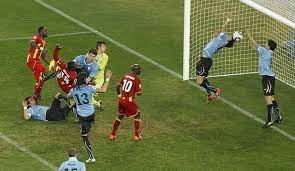
Unluckily, Asamoah Gyan missed the subsequent penalty kick off by hitting the top crossbar and Suárez celebrated the miss. Gyan converted his penalty in the shootout, as did everyone else until the fourth round of penalty kicks, when Adiyiah’s penalty was saved by Uruguayan goalkeeper Fernando Muslera. Maxi Pereira of Uruguay then put his penalty kick over the crossbar.
Muslera saved Captain John Mensah’s penalty, Ghana’s fifth. To win the match, Sebastián Abreu converted Uruguay’s fifth spot kick by lightly chipping it Panenka-style. Suárez claimed he had no choice and was acting instinctively. Milovan Rajevac, Ghana’s coach, called the play an “injustice,” and Suárez was nicknamed a “villain” and a “cheat.”
Ghana was the final African team left in the tournament, and if they had won, they would have become the first African team ever to reach the semifinals. Others, however, saw him as a hero who sacrificed himself in the semifinals for the unlikely chance that his team would win. Gyan, who was visibly upset admitted, “Suárez is a hero in his own country now because the ball was going in and he was holding it with his hand. He is now a hero.”
Also Read: Top 10 Highest Paid Players in the English Premier League (EPL)
FIFA 2010 World Cup,The Best Player Awards
Diego Forlan won the best player of the tournament and he was awarded the Golden Ball award.
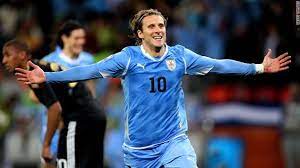
The Golden Ball award is given to the best player at each FIFA World Cup finals, with a shortlist created by the FIFA technical committee and the winner determined by media representatives. Those who finish second and third in the vote receive the Silver Ball and Bronze Ball awards as the tournament’s second and third most outstanding players, respectively.
- Golden Ball: Diego Forlan
- Silver Ball: Wesley Sneijder
- Bronze Ball: David Villa
In addition, Tomas Muller won the Golden Boot, an award for the top goal scorer in the tournament. David Villa won the silver boot with five goals and Wesley Sneijder won the Bronze boot with 5 goals as well.
FIFA 2010 World Cup, Spain Squad
Spain won the FIFA Fair Play Award in the tournament. Spain had never advanced beyond the quarter-finals. Their style of play named the tika-taka puzzled opponents and pushed them to the Soccer City showpiece. Andres Iniesta scored with the Adidas Jabulani to make Spain the eighth FIFA World Cup winner. In the overall tournament, they scored 8 goals, and received 8 yellow cards and zero red cards.
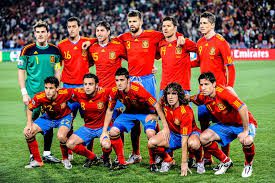
Squad;
Iker Casillas(1), Raul Albiol(2), Gerard Pique(3), Carlos Marchena(4), Carles Puyol(5), Andres Iniesta(6), David Villa(7), Xavi Hernandez(8), Fernando Torres(9), Cesc Fabregas(10) Joan Capdevilla(11), Victor Valdes(12), Juan Mata(13), Xabi Alonso(14), Sergio Ramos(15), Sergio Busquets(16), Alvaro Arbeloa(17), Pedro Rodriguez(18), Fernando Llorente(19), Javi Martinez(20), David Silva(21), Jesus Navas(22), Pepe Reina(23)
FIFA 2010 World Cup, The Final Match
The final of the FIFA 2010 World Cup took place on July 11, 2010, at Soccer City in Johannesburg. Spain defeated the Netherlands 1–0 in extra time, thanks to a goal from Andrés Iniesta who scored the winning goal of the final in the 116 minute. The win gave Spain their first World Cup title, becoming the eighth team to win it.
They became the first new winner of the tournament without home advantage since Brazil in 1958, as well as the first team to win the tournament after losing their first game. In the final match, there were multiple fouls committed. Howard Webb, the referee, issued 14 yellow cards, more than doubling the previous record for this game.
Netherlands’ John Heitinga was sent off for receiving a second yellow card. The Netherlands had chances to score, most notably in the 60th minute when Wesley Sneijder released Arjen Robben for a one-on-one with Spain’s goalkeeper Iker Casillas, only for Casillas to save the shot with an outstretched leg. Sergio Ramos of Spain missed a free header from a corner kick when he was unmarked. In extra time, Iniesta broke the deadlock with a volleyed shot off a pass from Cesc Fàbregas.
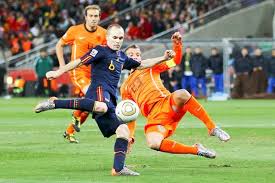
Before the final, there was a closing ceremony featuring singer Shakira. Following that, Nelson Mandela, former South African President, made a brief appearance on the pitch, wheeled in by a motor cart. On the other hand, there were reports of play-acting and fouls by some of the Spanish players.
In the World Cup final, Spain’s ball-possession strategy drew mixed reactions. While some maintained that it was effective, but “boring”, others claimed it was “beautiful”. It was also the first time a European nation had won a World Cup Finals that had not been held on European soil.
The Netherlands team was welcomed by an estimated 700,000 supporters lining the canal banks, as team captain van Bronckhorst and coach Bert van Marwijk were named Knights in the Order of Orange-Nassau by Queen Beatrix.
Who Knocked Out Germany in 2010?
Thomas Müller subsequently scored two goals in the second half, extending Germany’s lead to 4–1. His first came at the end of a swift German counter-attack in the 67th minute, the goal being assisted by Bastian Schweinsteiger.
What was special about the 2010 FIFA World Cup?
The 2010 FIFA World Cup™ meant more to South Africa than this time-honored sport, though. This event saw a massive rejuvenation of local resources and infrastructure, a cooperation amongst so many industries, to make it the best, most vibrant, and most efficient event of the century.
Who won the best player in the 2010 World Cup?
Diego Forlan won the best player of the tournament and he was awarded the Golden Ball award.
Where did Ghana reach in the 2010 World Cup?
Ghana advanced to the quarter-finals of the 2010 World Cup and they were eliminated by Uruguay. Ghana was the final African team left in the tournament, and if they had won, they would have become the first African team ever to reach the semifinals.
Who missed the penalty for Ghana?
Ghana sent a free kick into the box late in extra time, but Luis Suárez blocked Stephen Appiah’s shot on the goal line. On the rebound, Dominic Adiyiah’s header was heading into the goal, but Suárez blatantly blocked the shot with his hands to prevent what would have been the game-winning extra-time goal, and he was given a direct red card. Unluckily, Asamoah Gyan missed the subsequent penalty kick-off by hitting the top crossbar and Suárez celebrated the miss.

